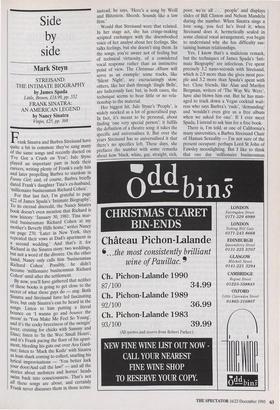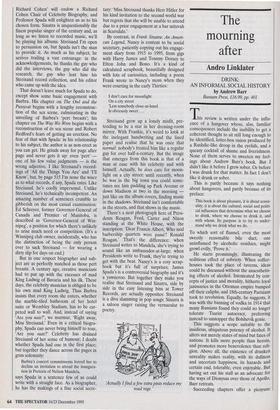Side by side
Mark Steyn
STREISAND: THE INTIMATE BIOGRAPHY by James Spada Little, Brown, £18.99, pp. 552 FRANK SINATRA: AN AMERICAN LEGEND by Nancy Sinatra Virgin, £25, pp. 368 rank Sinatra and Barbra Streisand have quite a bit in common: they've sung many of the same songs and recently dueted on `I've Got a Crush on You'; Jule Styne played an important part in both their careers, writing plenty of Frank's early hits and later propelling Barbra to stardom in Funny Girl; and, of course, Barbra briefly dated Frank's daughter Tina's ex-husband, millionaire businessman Richard Cohen'.
For that last fact, I'm grateful to page 422 of James Spada's 'Intimate Biography'. To its eternal discredit, the Nancy Sinatra book doesn't even mention that Richard is now history: 'January 30, 1981: Tina mar- ried businessman Richard Cohen at my mother's Beverly Hills home,' writes Nancy on page 270. 'Later m New York, they repeated their vows at Dad's apartment in asecond wedding.' And that's it for Richard in the Sinatra story: two weddings, but not a word of the divorce. On the other hand, Nancy only calls him 'businessman Richard Cohen'. Possibly, he didn't become 'millionaire businessman Richard Cohen' until after the settlement.
By now, you'll have gathered that neither of these books is going to get close to the secret of what these guys do — sing. Both Sinatra and Streisand have led fascinating lives, but only Sinatra's can be heard in the songs. Listen to him putting a literal bounce on 'I wanna go and bounce the moon' in 'You Make Me Feel So Young', and it's the cocky breeziness of the swingin' lover, cruising for chicks with Sammy and Dino; listen to 'In the Wee Small Flours', and it's Frank pacing the floor of his apart- ment, bleeding his guts out over Ava Gard- ner; listen to 'Mack the Knife' with Sinatra as loan shark coming to collect, snarling his lyrical improvisations — 'You better lock Your door/And call the law!' — and all the stories about mobsters and horses' heads swim back into consciousness. That's not all these songs are about, and certainly Frank never discusses them in those terms: instead, he says, 'Here's a song by Weill and Blitzstein. Sheesh. Sounds like a law firm.'
Would that Streisand were that relaxed. In her stage act, she has cringe-making scripted exchanges with the disembodied voice of her analyst about her feelings. She talks feelings, but she doesn't sing them. In the songs, you're aware not of feeling but of technical virtuosity, of a considered vocal response rather than an instinctive point of view. The Christmas Album will serve as an example: some tracks, like `Silent Night', are excruciatingly slow; others, like her dash through 'Jingle Bells', are ludicrously fast; but, in both cases, the technique seems to bear little or no rela- tionship to the material.
Her biggest hit, Jule Styne's 'People', is widely mocked as a lot of generalised pap. In fact, it's meant to be personal, about finding 'one very special person'; it fulfils the definition of a theatre song: it takes the specific and universalises it. But over the years Streisand has so universalised it that there's no specifics left. These days, she prefaces the number with some remarks about how 'black, white, gay, straight, rich, poor, we're all . . . people' and displays slides of Bill Clinton and Nelson Mandela during the number. When Sinatra sings a love song, you feel he's lived it; when Streisand does it, hermetically sealed in some clinical vocal arrangement, you begin to understand why she has difficulty sus- taining human relationships.
Yes, I know that's a malicious remark, but the techniques of James Spada's 'Inti- mate Biography' are infectious. I've spent precisely 3.2 nano-seconds with Streisand, which is 2.9 more than she gives most peo- ple and 3.2 more than Spada's spent with her. Close friends, like Alan and Marilyn Bergman, writers of 'The Way We Were', have also blown him out. But he has man- aged to track down a Vegas cocktail wait- ress who says Barbra's 'rude', 'demanding' and 'wouldn't even give us a free album when we asked for one'. If I ever meet Spada, I intend to ask him for a free book.
There is, I'm told, at one of California's many universities, a Barbra Streisand Chair of Human Sexuality — I'm not sure of the present occupant: perhaps Lord St John of Fawsley moonlighting. But I like to think that one day 'millionaire businessman Richard Cohen' will endow a Richard Cohen Chair of Celebrity Biography, and Professor Spada will enlighten us as to his chosen form. Sinatra is unquestionably the finest popular singer of the century and, as long as we listen to recorded music, we'll be playing his albums. Streisand I'm open to persuasion on, but Spada isn't the man to provide it. As much as his subject, he arrives trailing a vast entourage: in the acknowledgements, he thanks the guy who did the interviews, the guy who did the research, the guy who lent him his Streisand record collection, and his editor who came up with the idea.
That doesn't leave much for Spada to do, except show some basic engagement with Barbra. His chapter on The Owl and the Pussycat begins with a lengthy reconstruc- tion of the sex scene, culminating in the unveiling of Barbra's 'pert breasts'; his chapter on The Way We Were begins with a reconstruction of its sex scene and Robert Redford's fears of getting an erection. No fear of that with Spada: in his relationship to his subject, the author is as non-erect as you can get. He grinds away for page after page and never gets it up: even 'pert' one of his few value judgments — is the wrong adjective. I like Streisand's record- ings of 'All the Things You Are' and 'I'll Know', but, by page 515 I'm none the wiser as to what records, if any, Spada rates. Like Streisand, he's coolly impersonal. Unlike Streisand, he's technically incompetent. An amazing number of sentences crumble to gibberish on the most casual examination: Ed Schreyer, former Governor-General of Canada and Premier of Manitoba, is described as 'Governor-General of Win- nipeg', a position for which there's unlikely to arise much need or competition. (It's a Winnipeg club owner, incidentally, who has the distinction of being the only person ever to sack Streisand — for wearing a dirty slip for days on end.) But in one respect biographer and sub- ject are as perfectly matched as those pert breasts. A century ago, creative musicians had to put up with the excesses of mad King Ludwig of Bavaria and his ilk. These days, the celebrity musician is obliged to be his own mad King Ludwig. Thus Barbra insists that every room she enters, whether the marble-tiled bathroom of her hotel suite or Wembley Stadium, has to be car- peted wall to wall. And, instead of saying `Are you nuts?', we murmur, 'Right away, Miss Streisand.' Even in a critical biogra- phy, Spada can never bring himself to roar, `Are you nuts?' Celebrity has drained Streisand of her sense of humour; I doubt whether Spada had one in the first place; but together they dance across the pages in grim solemnity:
Barbra's concert commitments forced her to decline an invitation to attend the inaugura- tion in Pretoria of Nelson Mandela,
says Spada in a sentence few of us could write with a straight face. As a biographer, he has the makings of a fine social secre- tary: 'Miss Streisand thanks Herr Hitler for his kind invitation to the second world war but regrets that she will be unable to attend due to a prior engagement at a bar mitzvah in Scarsdale.'
By contrast, in Frank Sinatra: An Ameri- can Legend, Nancy is content to be social secretary, patiently copying out his engage- ment diary from 1915 to 1995, from gigs with Harry James and Tommy Dorsey to Elton John and Bono. It's a kind of calculated scrapbook, beautifully designed with lots of curiosities, including a poem Frank wrote to Nancy's mom when they were courting in the early Thirties:
I don't care for moonlight On a city street 'Less somebody close-at-hand Is obviously sweet
Streisand grew up a lonely misfit, pre- tending to be a star in her dressing-room mirror. With Frankie, it's weird to lobk at the inelegant handwriting and the lined paper and realise that he was once that normal: nobody's treated him like a regular guy for over half-a-century. But the image that emerges from this book is that of a man at ease with his celebrity and with himself. Actually, he does care for moon- light on a city street: until recently, when he was in the big town you could some- times see him padding up Park Avenue or down Madison at two in the morning just like on the album covers, finding music in the shadows. Streisand isn't comfortable in the streets, and that shows in the music.
There's a neat photograph here of Presi- dents Reagan, Ford, Carter and Nixon standing at the White House, with the inscription: 'Dear Francis Albert, Who said barbership quartets were passé? Ronald Reagan.' That's the difference: when Streisand writes to Mandela, she's trying to sound like an ambassador-at-large; when Presidents write to Frank, they're trying to get with the beat. Nancy's is a cosy scrap- book but it's full of surprises; James Spada's is a controversial biography and it's a yawneroo. But together they make you realise that Streisand and Sinatra, side by side in the easy listening bins at Tower Records, are actually opposites: Streisand is a diva slumming in pop songs; Sinatra is a saloon singer raising the vernacular to poetry.
Actually I find a few extra pints reduce my road rage.'











































































































 Previous page
Previous page